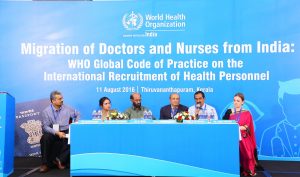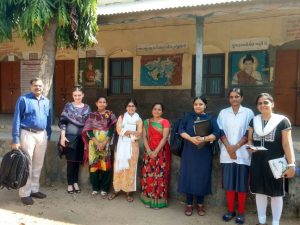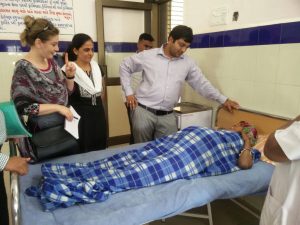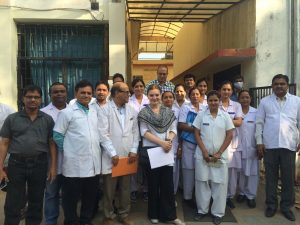 After graduating from Yerevan State Medical University, Dr. Irina Papieva (MPH ‘05) continued her education at the American University of Armenia (AUA). One year after her graduation, she began her career at the World Health Organization (WHO). With 14 years of experience at WHO, Dr. Papieva has worked in Armenia, India, and Switzerland. Her work has led to great strides in pandemic preparedness and response, as well as patient safety and quality.
After graduating from Yerevan State Medical University, Dr. Irina Papieva (MPH ‘05) continued her education at the American University of Armenia (AUA). One year after her graduation, she began her career at the World Health Organization (WHO). With 14 years of experience at WHO, Dr. Papieva has worked in Armenia, India, and Switzerland. Her work has led to great strides in pandemic preparedness and response, as well as patient safety and quality.
Tell us a bit about yourself and your background, as well as your experience as a student at AUA’s School of Public Health.
I was born and raised in Yerevan, and had a joyful childhood full of sweet memories and unforgettable stories. The journey of my professional development began in 1988, when I witnessed the first signs of political instability in Armenia, following the devastating earthquake that left hundreds of thousands of people killed, injured, or homeless. I was in school at the time and had already decided on a career path. As someone who was very interested in languages, literature, geography, history, and philosophy, I wanted to become a diplomat to explore how these fields related to one another, and how the concepts and principles put forth would contribute to world peace and stability. It was an ambitious dream. The earthquake, however, prompted me to shift from big-picture thinking to the reality on the ground. It was simple: people needed help just to survive. So, one morning in mid-December 1988, I woke up and told my parents that I was going to become a medical doctor, because I wanted to do something truly useful to the world. I wanted to serve people by helping them and by saving their lives.
In 1997, I received my qualification as a general practitioner from Yerevan State Medical University. I then pursued a specialty in allergy and immunology and continued my career as a clinical doctor in one of Yerevan’s big hospitals. I chose this discipline because it was still developing and underexplored at the time — something I’ve always sought out in all aspects of my life. I loved my job very much; it felt great to connect with patients and their families. As I gained experience in my specialty and learned how the Armenian health system operates, I realized that being a good and compassionate doctor is not enough to ensure that patients receive effective treatment and live a healthy life. The system must be strengthened to better provide people with sustainable support. I had many questions, but no answers. This led me to my next move: AUA’s School of Public Health.
As Armenians, we are very fortunate to have the unique opportunity for an education in an encouraging environment such as the one at AUA. We are able to learn from leading professionals from around the world; how to work in teams and communicate effectively with people from different backgrounds; how to think critically and find different solutions to an issue; and much more. Having access to all of this in our home country is particularly exceptional. AUA’s School of Public Health was an eye-opener for me; not only in terms of the skills and knowledge I gained in the field, but also in terms of how to think and communicate openly and comprehensively with others while respecting their opinions and empowering one another. This was a fundamental shift in my professional development that laid a very strong foundation for my future path.
Tell us about your journey after AUA. What opportunities did your MPH degree provide? How did you start working with the World Health Organization (WHO)?
My AUA journey has shaped me both as a professional and as an individual. After graduation, I was equipped with the knowledge and skills necessary to pursue a public health career in different places and contexts. I was open to explore new opportunities, face challenges, and take risks. I started with short-term assignments and volunteer work while continuing to apply to various positions.
I got my first assignment in the WHO Country Office in Armenia almost one year after graduating from AUA. I was offered the position to coordinate a newly approved project on the avian influenza. In 2006, the first human cases of avian influenza were registered in the region and neighboring countries. In an effort to bolster Armenia’s preparedness and response capacities, the RA Ministry of Health decided to prioritize strengthening structures and mechanisms to ensure an effective response to possible outbreaks. It was a unique opportunity to apply my knowledge and skills and to be at the center of something new and important for my country. I can’t say that it was easy. The world was dealing with something new. The project details were finalized and agreed upon by key stakeholders throughout the project. I started to learn how WHO operates at the national, regional, and global levels. I learned about the wide range of resources available within the organization and how to navigate the emerging data and knowledge. Although the position did not offer much job security, I took it without hesitation and worked very hard. The project was completed successfully, and the scope of my work expanded from avian influenza preparedness to pandemic influenza preparedness, then to the implementation of International Health Regulations (IHR), broader disaster preparedness and response, and strengthening healthcare systems overall. I continued to learn, expand my skills, and gain more experience each day.
You have worked in three different countries/positions for WHO. How have your experiences differed in Armenia, India, and Switzerland?
I have been at WHO for 14 years. My time at WHO began in the relatively small Country Office in Armenia with an ambitious scope of work, ranging from engagement in policy-making processes to collaboration with stakeholders, partnership building, and project implementation. For me, working in the country office as a national officer meant finding the right balance between my responsibilities and commitments to serve my country, and my responsibilities and commitments to accomplish the organization’s goals while representing a specialized UN agency on a national level. Though challenging, the satisfaction and pride one feels for serving one’s country through their work is incomparable.
 I relocated to the WHO Country Office in India in 2014. It has the largest WHO representation of any nation on both national and state levels. As such, the scope of work there was greater, and was even more challenging because of different systemic issues, including the lack of basic infrastructure, the double burden of both communicable and non-communicable diseases, a critical shortage of health professionals, an unregulated private sector, and extreme fragmentation of the healthcare system. The scope of my work included improving the safety and quality of care within the broader universal health coverage (UHC) agenda. This was quite challenging, as it required the involvement of a broad range of stakeholders at various levels and a holistic approach. I remember sleepless nights of trying to solve the Indian puzzle, integrating structures with policies, issues with available solutions, systemic elements with stakeholders, connecting numbers and maps, people and names.
I relocated to the WHO Country Office in India in 2014. It has the largest WHO representation of any nation on both national and state levels. As such, the scope of work there was greater, and was even more challenging because of different systemic issues, including the lack of basic infrastructure, the double burden of both communicable and non-communicable diseases, a critical shortage of health professionals, an unregulated private sector, and extreme fragmentation of the healthcare system. The scope of my work included improving the safety and quality of care within the broader universal health coverage (UHC) agenda. This was quite challenging, as it required the involvement of a broad range of stakeholders at various levels and a holistic approach. I remember sleepless nights of trying to solve the Indian puzzle, integrating structures with policies, issues with available solutions, systemic elements with stakeholders, connecting numbers and maps, people and names.
 Perhaps most importantly, India influenced me to reconsider and reevaluate many important aspects of work and life. It was during my time there that I truly understood the importance of human touch and the power of connection, empathy, compassion, respect, and understanding. I learned to balance professionalism and diplomacy with a human touch. It was one of the most important times of my life, and India will always hold a very special place in my heart.
Perhaps most importantly, India influenced me to reconsider and reevaluate many important aspects of work and life. It was during my time there that I truly understood the importance of human touch and the power of connection, empathy, compassion, respect, and understanding. I learned to balance professionalism and diplomacy with a human touch. It was one of the most important times of my life, and India will always hold a very special place in my heart.
In 2017, I moved to the WHO headquarters in Geneva, Switzerland. This position required a global mindset in approaching issues. Working at a global level has its own challenges. Firstly, the development of global policies and strategies requires understanding the issues from multiple perspectives and contexts. We work with a broad range of stakeholders, including but not limited to patients and patient organizations, health professionals, professional associations, health facilities, international organizations, academic and research institutions, and civil society organizations. In our work, we have to consider different contexts, including countries of all levels of economic standing, as well as both peaceful and conflict zones. Secondly, we must be in constant contact with WHO regional and country offices to ensure that we are reflecting regional and country priorities in our work. We must also coordinate our work within WHO’s internal departments and programs, so that we complement one another’s work and avoid duplications.
My area of work, patient safety and quality improvement, is particularly challenging. Patient safety and quality improvement is important at all levels and for any type of care, as it relates to all clinical disciplines and intersects with all disease-specific programs. It requires strong teamwork and patient engagement. I particularly like how approaches for improving patient safety and quality of care don’t fit into a specific box, which makes them even more challenging to adopt. Any challenge is an opportunity, and if used wisely, can contribute to further development and success. I love what I do a lot, and I feel that my current position in WHO connects everything I’ve learned throughout my professional career, as well as my thoughts as a young dreamer with my passion and empathy as an individual.
Having worked in Switzerland for over two years now, do you notice any differences between Armenia/other former Soviet Union (FSU) countries and Scandinavian countries regarding pandemic preparedness and response? If so, what are they?
The main differences between Scandinavian and FSU countries regarding pandemic preparedness and response (and beyond) stem from how national policies and strategies are formulated and implemented. Scandinavian countries mostly exercise a truly bottom-up approach in policy-making processes, engaging up front all key stakeholders that will be involved in policy implementation. The approach in FSU countries is different, with a prevailing top-down approach which does not always engage key stakeholders.
Regardless of how well the policies are structured and written, the most important aspect in the policy process is its implementation in the country. Particularly, the role of patients, their families, civil society, and the role of health professionals and professional associations is critical in policy design. In Scandinavian countries, I find those groups to be very proactive in the policy-making processes, with a strong sense of ownership and responsibility toward national policies. Also, they are equipped with the necessary knowledge and skills to effectively contribute to these processes, and the governments are actively involved in building these groups’ capacities and promoting their participation at the national level. Scandinavian governments empower these stakeholders groups to participate in policy processes through different mechanisms, such as establishment of collaborative networks, and development of tools for engagement and empowerment, among others. With the engagement of key stakeholders, there is a collective sense of responsibility and accountability, which is critical for the effective and sustainable implementation of any policy.
What are the most notable projects you have spearheaded or contributed to through WHO, or the ones in which you take the most pride?
Being at the center of setting up the influenza preparedness and response system and initiating the implementation of International Health Regulations in Armenia proved to be one of my greatest achievements while working in WHO Country Office in Armenia. In 2006, the RA government was working toward strengthening the structures and mechanisms that ensure an effective response to outbreaks. It was critical to develop effective strategies and interventions with an efficient use of resources. In 2006, there was no public laboratory in the country that used PCR methodology to identify infectious agents, including influenza. We worked very hard with the Ministry of Health and other stakeholders to equip the central and two state laboratories with all the necessary resources, build the capacity of healthcare professionals, and establish the laboratory network in the country for influenza surveillance. This was further transformed into the broader network that now operates quite effectively in responding to disease outbreaks, including the COVID-19 pandemic. The implementation of International Health Regulations in 2007 was also something new at the time, both for Armenia and for WHO. It took a lot of effort from my colleagues and me to lift Armenia up to become one of the most successful countries in the region regarding the implementation of International Health Regulations. I feel great pride in our collaboration with colleagues from the Ministry of Health and other ministries and partners. Our collective efforts and past success have a particular significance today.
 In India, I was working in the area of patient safety and quality of care. Though there were many good initiatives and improvement examples across the country, the quality of care agenda has never been considered as a policy objective and addressed in a holistic way. I was able to change that, incorporating patient safety and quality of care in a broader health system strengthening agenda and bringing that to the center of universal health coverage policies. Considering the multiplicity of stakeholders in India, it was important to recognize not only the differences in their roles and responsibilities, but also the intersection between them and complementarity of their work in ensuring patient safety and improving quality of care. And that was a key. With my support, the group of professionals led by the Indian government developed the national patient safety implementation framework, as well as addressed the effectiveness dimension of quality of care through several initiatives, which paved the way for a series of subsequent achievements in the country.
In India, I was working in the area of patient safety and quality of care. Though there were many good initiatives and improvement examples across the country, the quality of care agenda has never been considered as a policy objective and addressed in a holistic way. I was able to change that, incorporating patient safety and quality of care in a broader health system strengthening agenda and bringing that to the center of universal health coverage policies. Considering the multiplicity of stakeholders in India, it was important to recognize not only the differences in their roles and responsibilities, but also the intersection between them and complementarity of their work in ensuring patient safety and improving quality of care. And that was a key. With my support, the group of professionals led by the Indian government developed the national patient safety implementation framework, as well as addressed the effectiveness dimension of quality of care through several initiatives, which paved the way for a series of subsequent achievements in the country.
The last couple of years has seen unprecedented calls for global action to address the huge issue of patient harm in healthcare. I work in the patient safety flagship program in WHO Headquarters. In 2019, the global patient safety movement, which involved many countries, our partners around the world, and our team, spearheaded the adoption of the resolution by the 72nd World Health Assembly on “Global Action on Patient Safety.” This resolution urges every partner country to recognize patient safety as a key priority in health sector policies and programs and take concerted action to reduce the burden of patient harm due to unsafe healthcare. The resolution also prompted the establishment of World Patient Safety Day, which is now one of nine official global public health days that WHO will observe each year on September 17, in collaboration with countries and partners at all levels. This is certainly a team effort, though I take great pride in this achievement as a team member and as a professional.
What advice would you offer to your 20-year old self or to students who are currently in AUA’s School of Public Health?
I would advise my younger self to take the same path I have taken, with the same enthusiasm and the same simple mottos:
Think. Yes, it’s as simple as that. Think when you communicate and ask questions. Think before you criticize or give compliments. Think before you make choices and decisions. Think before you act.
Challenge yourself, and never stop learning and exploring new things. This is a basis for self-development and success.
Be flexible and ready to embrace challenges in a fast-changing environment. Within any challenge lies an opportunity.
Never give up. There is always a positive element, even if something seems to be a total failure or disaster.
Don’t be afraid of being different, but be responsible and accountable for that difference.
Be empathetic and passionate about what you do and never go with the flow.
